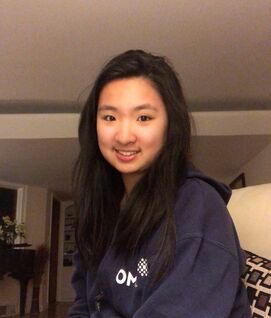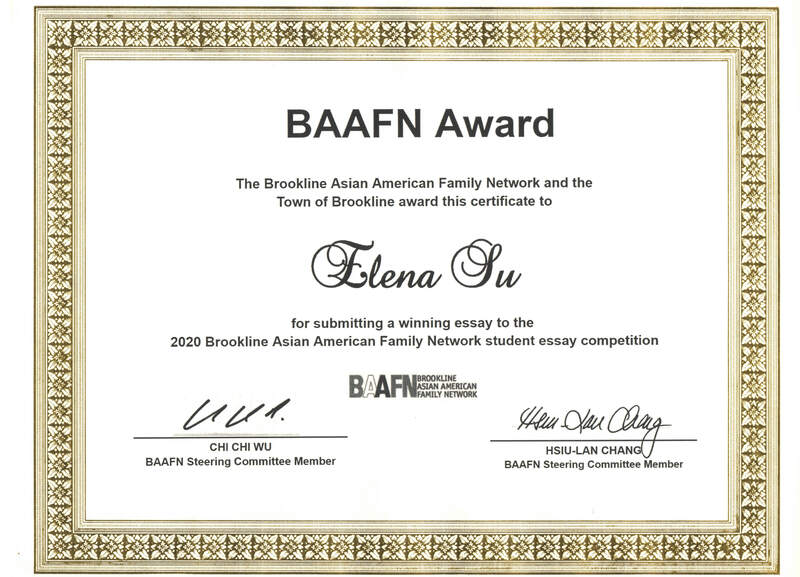2020 BAAFN Award
American Like Them
by Elena Su
by Elena Su
My childhood straddled two worlds. My upbringing was neither completely Chinese nor American, but somewhere in the nebulous space between. I ate foods from two cultures, read books in two languages, and sang the national anthems of two countries. I was enrolled in Catholic school when I was four. I first realized that something was wrong when my teacher pulled me aside to ask me if I understood English at all. Students tugged on the corners of their eyes, asked me where my parents were from, and lined our arms side-by-side to compare their pale skin to my darker complexion. In school, I learned how to spell and multiply and tell nouns from adjectives and verbs. I also learned that I was different, exotic, foreign: the girl with the dark hair and dark eyes; the girl who didn’t have mashed potatoes and steak for dinner; the girl whose parents spoke flawed, accented English. The girl who wasn’t American like them. Slowly, I stopped thinking of myself as American. After all, my parents didn’t speak English at home. I wasn’t allowed to wear shoes inside the house. And whenever I turned on the television, I couldn’t see any protagonists that looked like me—all the Asian characters seemed to be doctors, computer scientists, and engineers. Eventually, I came to see American as a synonym for white. After all, I had never been told anything else. In response, I began to push my family’s culture aside like it was shameful. My books of Chinese poems collected dust as I memorized verses by Frost and Longfellow. I asked for chocolate cake on my birthdays instead of the noodles that my mother painstakingly prepared for me. I stopped speaking Mandarin at home and insisted my family do the same. Even as I lost fluency in the language, I told myself that I was finally becoming truly American. This past summer, I visited China for the first time in my life. When we arrived in Beijing, the air was oppressively hot. The billboards were plastered with symbols I couldn’t recognize anymore. As we drove towards the house where my mother had grown up, I felt a sudden, acute regret—I wanted to be able to trade stories with my cousins, introduce myself to the neighbors, and laugh with my grandparents over dinner. Instead, I couldn’t even speak enough Mandarin to describe my own high school. I had bid to gain acceptance, but I had only ended up losing half of my identity in the process. Last August, I realized that my family’s history is precious. My grandmother grew up during the Cultural Revolution. My mother moved overseas at twenty-two without knowing a word of English. My father immigrated to America so he could make enough money to support his family. Even after so many years, their bravery still inspires me to dream boldly and to pursue those dreams at all costs.
If I could meet a younger version of myself, I would take her hand and tell her that her Chinese and American halves are not at war. Instead, they coexist in a delicate equilibrium; neither is more important than the other because both are priceless. My Chinese identity will never invalidate the fact that I am just as American as anyone else. When I was nine, shy and insecure and wanting desperately to be accepted, I just wish I’d known that I was more than a bundle of stereotypes. That Asian-Americans are not just doctors and engineers, but lawyers and actresses and artists. That to be Asian-American is to be strong. That I don’t have to be “American like them”— I have my own family’s history and my own dreams and my own unique position at the intersection between two worlds. And that is more than enough.
If I could meet a younger version of myself, I would take her hand and tell her that her Chinese and American halves are not at war. Instead, they coexist in a delicate equilibrium; neither is more important than the other because both are priceless. My Chinese identity will never invalidate the fact that I am just as American as anyone else. When I was nine, shy and insecure and wanting desperately to be accepted, I just wish I’d known that I was more than a bundle of stereotypes. That Asian-Americans are not just doctors and engineers, but lawyers and actresses and artists. That to be Asian-American is to be strong. That I don’t have to be “American like them”— I have my own family’s history and my own dreams and my own unique position at the intersection between two worlds. And that is more than enough.



